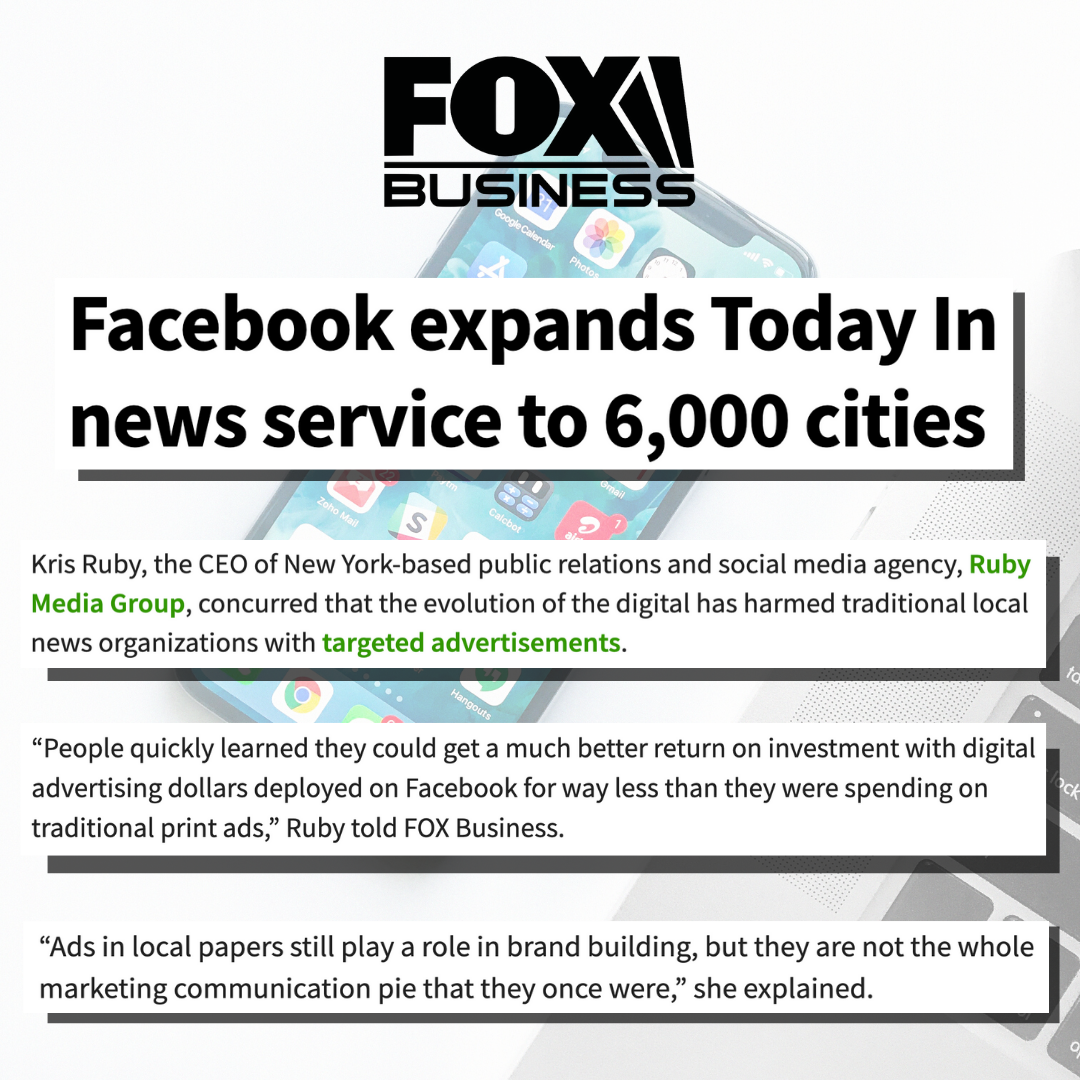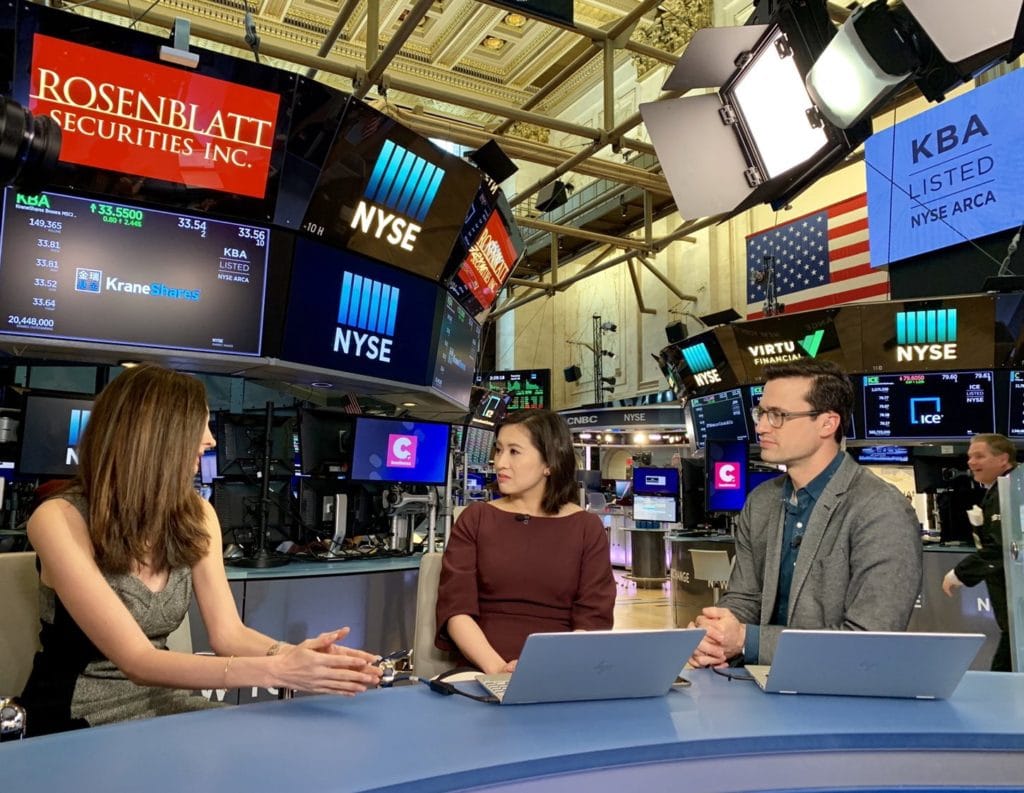|
Getting your Trinity Audio player ready...
|
Social Media Strategist Kris Ruby CEO of Ruby Media Group recently joined Cheddar live from The New York Stock Exchange to discuss innovative ways the publishing industry is changing the way it looks at revenue and why companies are investing in millennial talent.
In this video, Digital Media Strategist Kris Ruby discusses:
- Why a recent study showed a positive outlook for magazine media and what to make of the outlook.
- How media companies are taking a new approach to making money
- How social media plays a role in media companies making money and if it is truly a reliable revenue source
- How other companies can keep up when Facebook and Google have a combined 57.1% of market share this year
PLUS the answer to…
- Is there any money to be made in print or is it all in digital?
Watch to find out!

HOW SOCIAL MEDIA IMPACTS PUBLISHERS
Social media changed the way we consume news. But is this a good thing?
Why are local newspapers struggling?
Newspapers are struggling because newsrooms are shrinking locally and they don’t have the infrastructure and team to support the massive demands that traditional print publishing requires. This is why you have seen so many local newspapers get acquired by larger regional players in their respective markets. This is a major problem for local news.
People depend on local news for reporting and to know what is happening locally in their area. Now, you have added pressure of these traditional print outlets to make quota and fill dormant ad space.
What does this mean for journalism?
It means the notion of church and state from an editorial perspective is slowly shrinking and the lines are becoming blurred. This is also why you have seen such an increase in advertorial and sponsored content. Local newspapers and media outlets are looking for new ways to reinvent themselves to stay alive in a media landscape that is rapidly declining.
This makes it even more challenging for people who really want to get their business featured in the local news because it is becoming increasingly difficult to get organic editorial without also placing ads in these outlets.
As a publicist of 15 + years, I can unequivocally say this. I see it all the time and also have to explain the process of how local media has changed and how the new media landscape works.
SOCIAL MEDIA’S IMPACT ON LOCAL ADVERTISING
Has social media harmed or helped news organizations?
Unfortunately, social media has harmed local news organizations. Why? Because with targeted Facebook ads, people quickly learned they could get a much better ROI with digital advertising dollars deployed on Facebook for way less than they were spending on traditional print ads.
Plus, these print ads aren’t targeted and pinpointed as precisely as Facebook ads are. There is simply no comparison in the precise targeting options that digital social marketing offers.
Ads in local papers still play a role in brand building, but they are not the whole marketing communication pie that they once were. Social media tech giants have substantially cut into the profits of local media outlets.
Is social media good for local advertising and local publishers?
Social media has also made it increasingly harder on the responsibilities of journalists. Instead of only focusing on reporting, local journalists also have to focus on how to get more eyeballs to their Facebook news page or Instagram account.
Journalists and news anchors are under tremendous pressure from the higher-ups at the local news stations they work for to get more followers and likes on social media. They have to worry about being brands on social media in addition to reporting the news.
Don’t you want your local news reporter to be laser-focused on reporting the news, instead of focusing on reporting in addition to how to get more Facebook fans?
THE DANGERS OF LIVING IN A NEWS DESERT
Why is local news important and what are the dangers of living in a news desert?
Local news is important, especially for an aging population in a specific region. This may be the main way they access their news if they are not able to be as mobile as they once were. The dangers of living in a news desert are extreme.
Whoever controls the news controls the narrative. If you only receive your news from a few sources, such as Facebook, that news may be skewed and can contain bias. Plus, Facebook has gone back and forth on what their role really is.
- Is Facebook a media company?
- Is Facebook a publishing platform?
Facebook has yet to take a definitive stance on answering these very basic questions.
Facebook also needs more content moderators and a standard set of content guidelines if they are going to be in the role they have found themselves in. They cannot change the guidelines when they deem fit to support a narrative.
Facebook and Google control what we see. That means if Facebook decides that vaccine information is bad, they won’t show it to users. This is dangerous for users. Why?
Traditionally, consumers had access to ALL information on both sides of any topic and could decide for themselves.
That’s no longer an option if big tech makes publishing decisions and tells you what is real and what is fake.
Shouldn’t consumers get to decide that?

Social Media and the Future of Traditional Publishing
It is dangerous for Google or Facebook or big tech to control the news. They control the entire search market- they are not neutral parties here. Massive ad dollars are deployed at these companies and when advertising is involved, that will impact what information is shown to consumers. It shouldn’t. There should be a clear delineation, but unfortunately, we are living in a new world where it is all blurred because of social media.
The dangers far surpass Facebook or Google. There are news dangers on every major publishing site that allows contributors too. When you allow this to go unchecked and publishers have people contributing content marked as journalism without a system of checks and balances, you ultimately dilute the name of that publishing outlet.
Something has to change or journalism as we once knew it will become extinct.
RESOURCES
Fox Business Interview “Facebook Expands Today In News”
Traditional Marketing Vs. Digital Marketing
KRIS RUBY is the CEO of Ruby Media Group, an award-winning public relations and media relations agency in Westchester County, New York. Kris Ruby has more than 15 years of experience in the Media industry. She is a sought-after media relations strategist, content creator and public relations consultant. Kris Ruby is also a national television commentator and political pundit and she has appeared on national TV programs over 200 times covering big tech bias, politics and social media. She is a trusted media source and frequent on-air commentator on social media, tech trends and crisis communications and frequently speaks on FOX News and other TV networks. She has been featured as a published author in OBSERVER, ADWEEK, and countless other industry publications. Her research on brand activism and cancel culture is widely distributed and referenced. She graduated from Boston University’s College of Communication with a major in public relations and is a founding member of The Young Entrepreneurs Council. She is also the host of The Kris Ruby Podcast Show, a show focusing on the politics of big tech and the social media industry. Kris is focused on PR for SEO and leveraging content marketing strategies to help clients get the most out of their media coverage.

